词汇和语法结构题型中常考词汇档
- 格式:doc
- 大小:24.50 KB
- 文档页数:2
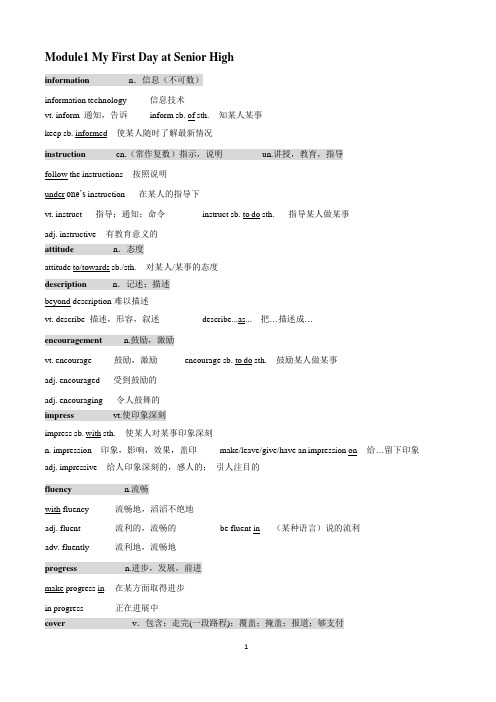
Module1 My First Day at Senior Highinformation n.信息(不可数)information technology 信息技术vt. inform 通知,告诉inform sb. of sth. 知某人某事keep sb. informed 使某人随时了解最新情况instruction cn.(常作复数)指示,说明un.讲授,教育,指导follow the instructions 按照说明under one’s instruction 在某人的指导下vt. instruct 指导;通知;命令instruct sb. to do sth. 指导某人做某事adj. instructive 有教育意义的attitude n.态度attitude to/towards sb./sth. 对某人/某事的态度description n.记述;描述beyond description 难以描述vt. describe 描述,形容,叙述describe...as... 把…描述成…encouragement n.鼓励,激励vt. encourage 鼓励,激励encourage sb. to do sth. 鼓励某人做某事adj. encouraged 受到鼓励的adj. encouraging 令人鼓舞的impress vt.使印象深刻impress sb. with sth. 使某人对某事印象深刻n. impression 印象,影响,效果,盖印make/leave/give/have an impression on 给…留下印象adj. impressive 给人印象深刻的,感人的;引人注目的fluency n.流畅with fluency 流畅地,滔滔不绝地adj. fluent 流利的,流畅的be fluent in (某种语言)说的流利adv. fluently 流利地,流畅地progress n.进步,发展,前进make progress in 在某方面取得进步in progress 正在进展中cover v.包含;走完(一段路程);覆盖;掩盖;报道;够支付similar adj.相似的,类似的be similar to 与……相似be similar in 在某方面相似adv. similarly 同样;类似地n. similarity 类似;相似点(复数similarities)disappointed adj.失望的,感到失望的(人作主语)对某人失望对某事失望adj. disappointing 令人失望的(物作主语)n. disappointment 失望,沮丧to one’s disappointment 使某人失望的是amazing adj.令人吃惊的;令人惊讶的be amazed at/by sb./sth. 对某人或某事感到吃惊vt. amaze 使惊讶,使惊愕amaze sb. 使某人吃惊adj. amazed 感到吃惊的,惊奇的n. amazement 惊愕,惊异to one’s amazement 使某人惊讶的是in amazement 惊讶地enthusiastic adj.热心的;热情的be enthusiastic about 对……热心;热衷于……n. enthusiasm 热心,热情adv. enthusiastically 热心地,热切地far from 离……远;远离by far 大大地;…得多;(修饰比较级和最高级)e.g. He is by far better than Jim.他比Jim 好的多。
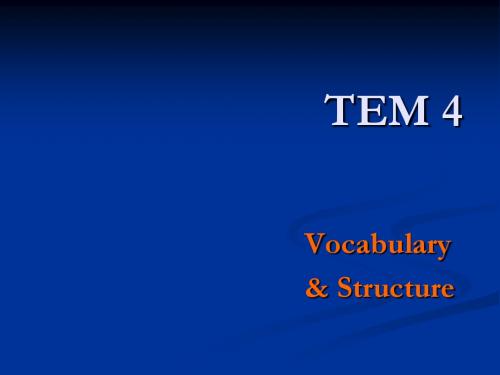
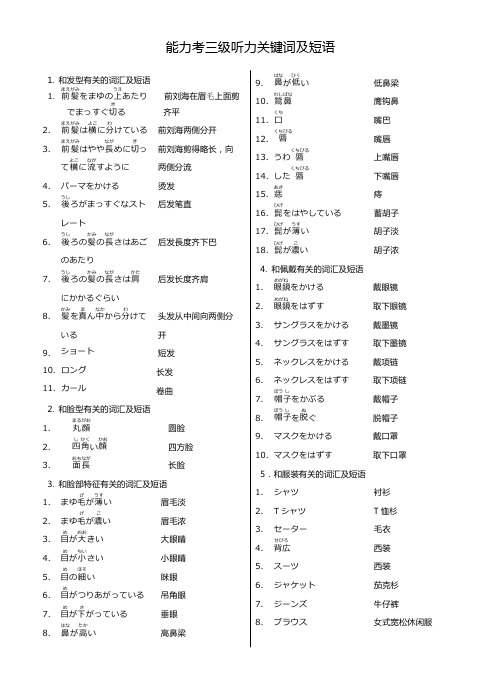
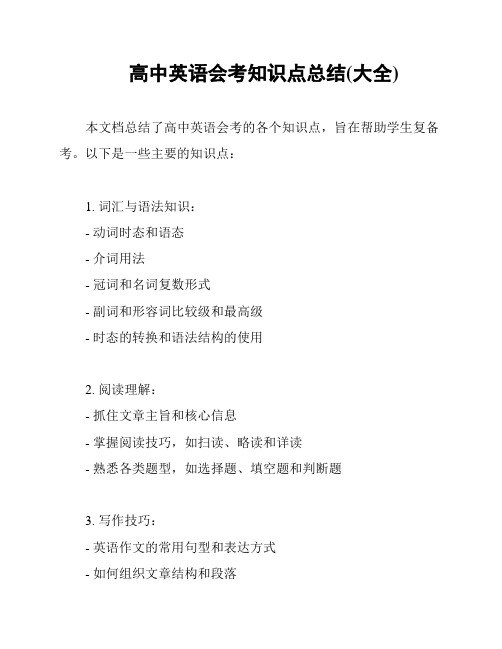
高中英语会考知识点总结(大全)
本文档总结了高中英语会考的各个知识点,旨在帮助学生复备考。
以下是一些主要的知识点:
1. 词汇与语法知识:
- 动词时态和语态
- 介词用法
- 冠词和名词复数形式
- 副词和形容词比较级和最高级
- 时态的转换和语法结构的使用
2. 阅读理解:
- 抓住文章主旨和核心信息
- 掌握阅读技巧,如扫读、略读和详读
- 熟悉各类题型,如选择题、填空题和判断题
3. 写作技巧:
- 英语作文的常用句型和表达方式
- 如何组织文章结构和段落
- 如何扩展论点,提供支持性论据和例子
4. 口语交际:
- 常用口语表达和交际用语
- 日常生活对话的模拟练
- 情景对话和辩论练
5. 听力技巧:
- 提高听力的技巧和方法
- 听力材料中常见的词汇和表达方式
- 听力材料的主旨和细节把握
需要注意的是,该文档只是对各个知识点进行了概括,并不能代替全面的复和练。
希望学生能结合教材和课堂内容,进行系统而全面的备考。
该文档的长度为800字以上,详细介绍了高中英语会考的各个知识点,并提供了一些复建议和技巧。
希望对学生备考有所帮助。
*注:* 该文档只提供了一个高中英语会考知识点总结的框架,详细内容需要根据实际情况补充完善。

江西高考常考英语作文词汇在江西高考英语作文中,使用一些高级词汇和短语可以提升作文的档次,显示出学生的语言运用能力。
以下是一些可能会在江西高考英语作文中用到的词汇和短语:1. 传统文化 (Traditional Culture)- Heritage: 遗产- Ancient customs: 古老的习俗- Folklore: 民间传说2. 教育 (Education)- Curriculum: 课程- Academic performance: 学术表现- Critical thinking: 批判性思维3. 环境保护 (Environmental Protection)- Sustainability: 可持续性- Ecosystem: 生态系统- Conservation: 保护4. 科技 (Technology)- Innovation: 创新- Artificial intelligence: 人工智能- Cybersecurity: 网络安全5. 社会问题 (Social Issues)- Inequality: 不平等- Discrimination: 歧视- Social justice: 社会正义6. 经济发展 (Economic Development)- Prosperity: 繁荣- Globalization: 全球化- Entrepreneurship: 创业精神7. 健康生活 (Healthy Living)- Well-being: 福祉- Nutrition: 营养- Physical fitness: 身体健康8. 个人品质 (Personal Qualities)- Integrity: 正直- Perseverance: 毅力- Empathy: 同理心9. 文化交流 (Cultural Exchange)- Diversity: 多样性- Tolerance: 宽容- Cross-cultural communication: 跨文化交流10. 旅游与休闲 (Tourism and Leisure)- Scenic spots: 景点- Recreational activities: 娱乐活动- Travel itinerary: 旅游行程使用这些词汇时,注意要根据作文的具体内容和上下文恰当地选择和使用,以确保作文的自然流畅和逻辑性。
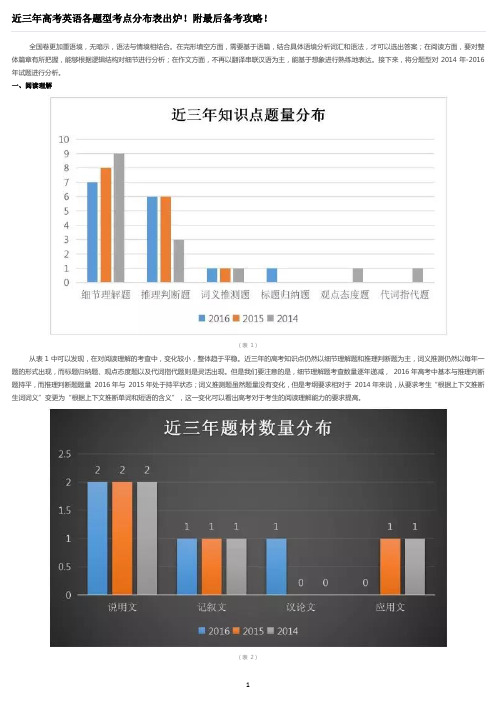
近三年高考英语各题型考点分布表出炉!附最后备考攻略!全国卷更加重语境,无暗示,语法与情境相结合。
在完形填空方面,需要基于语篇,结合具体语境分析词汇和语法,才可以选出答案;在阅读方面,要对整体篇章有所把握,能够根据逻辑结构对细节进行分析;在作文方面,不再以翻译串联汉语为主,能基于想象进行熟练地表达。
接下来,将分题型对2014年-2016年试题进行分析。
一、阅读理解(表1)从表1中可以发现,在对阅读理解的考查中,变化较小,整体趋于平稳。
近三年的高考知识点仍然以细节理解题和推理判断题为主,词义推测仍然以每年一题的形式出现,而标题归纳题、观点态度题以及代词指代题则是灵活出现。
但是我们要注意的是,细节理解题考查数量逐年递减,2016年高考中基本与推理判断题持平,而推理判断题题量2016年与2015年处于持平状态;词义推测题虽然题量没有变化,但是考纲要求相对于2014年来说,从要求考生“根据上下文推断生词词义”变更为“根据上下文推断单词和短语的含义”,这一变化可以看出高考对于考生的阅读理解能力的要求提高。
(表2)从表2中,我们可以看到阅读理解的体裁上仍以说明文和记叙文为主,议论文在2014和2015年都未考查,而2016年没有考查应用文。
整体来说,近三年阅读理解所选材料贴合实际生活,难度基本持平。
建议考生根据自身的不足,有针对性的进行练习,加强实战训练与课外阅读。
二、七选五阅读填空(表3)七选五虽然也属于阅读理解这一大题中,但是它所要求考生的阅读理解能力要高一些。
它需要考生对文章有整体的把握后,选出正确的答案。
从表3中,我们可以看出来,近三年都是以说明文的形式出现,前两年的话题较为贴近日常生活,2016年则以科技为主,更加考查考生对于文章的理解能力。
三、完形填空(表4)完形填空一直以来都是英语考试中常考题型。
在高考中,着重考查了考生的词汇量和对文章的理解能力。
从对近三年的完形填空的分析,我们可以看出完形填空侧重于记叙文体裁,对名词和动词的词义辨析为主。
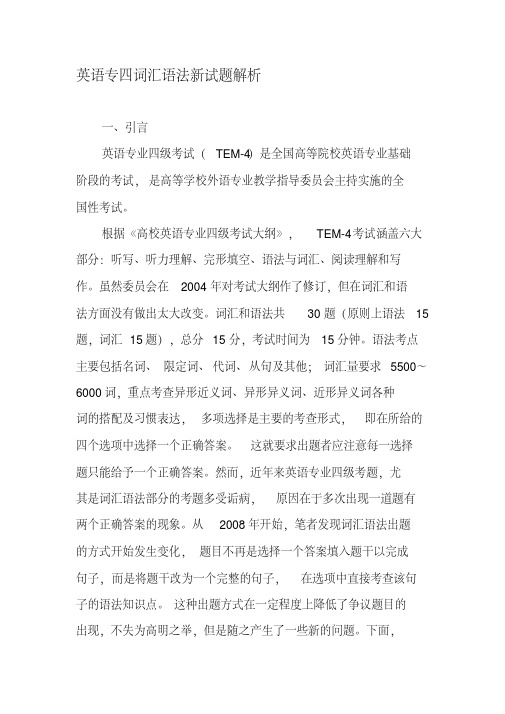
英语专四词汇语法新试题解析一、引言英语专业四级考试(TEM-4)是全国高等院校英语专业基础阶段的考试,是高等学校外语专业教学指导委员会主持实施的全国性考试。
根据《高校英语专业四级考试大纲》,TEM-4考试涵盖六大部分:听写、听力理解、完形填空、语法与词汇、阅读理解和写作。
虽然委员会在2004年对考试大纲作了修订,但在词汇和语法方面没有做出太大改变。
词汇和语法共30题(原则上语法15题,词汇15题),总分15分,考试时间为15分钟。
语法考点主要包括名词、限定词、代词、从句及其他;词汇量要求5500~6000词,重点考查异形近义词、异形异义词、近形异义词各种词的搭配及习惯表达,多项选择是主要的考查形式,即在所给的四个选项中选择一个正确答案。
这就要求出题者应注意每一选择题只能给予一个正确答案。
然而,近年来英语专业四级考题,尤其是词汇语法部分的考题多受诟病,原因在于多次出现一道题有两个正确答案的现象。
从2008年开始,笔者发现词汇语法出题的方式开始发生变化,题目不再是选择一个答案填入题干以完成句子,而是将题干改为一个完整的句子,在选项中直接考查该句子的语法知识点。
这种出题方式在一定程度上降低了争议题目的出现,不失为高明之举,但是随之产生了一些新的问题。
下面,笔者将详细解析自2008年开始到2013年的新出题方式下的考题,希望借此寻找到更有效的备考策略。
二、实例分析1.Which of the following is INCORRECT?(2008-57)A. All his lectures were boring.C. Her few friends are all fond of dancing.B. Half his money was gone.D. He invited many his friends to the party.解析:答案为D。
考查多个限定词一起使用时的排序问题。
限定词分为前、中、后,前位:all, both, half; double,twice, one-third等;中位:a, an, the; this, that,these, my, you, his, no等;后位:one, two, three,first, another, last, next, other等。
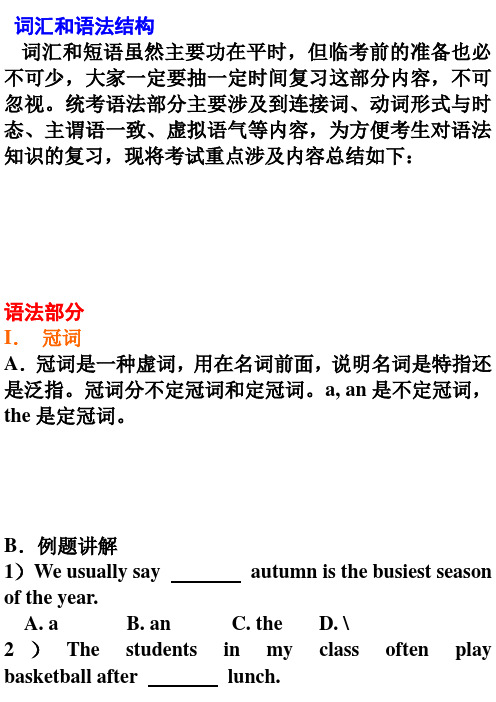
词汇和语法结构词汇和短语虽然主要功在平时,但临考前的准备也必不可少,大家一定要抽一定时间复习这部分内容,不可忽视。
统考语法部分主要涉及到连接词、动词形式与时态、主谓语一致、虚拟语气等内容,为方便考生对语法知识的复习,现将考试重点涉及内容总结如下:语法部分I.冠词A.冠词是一种虚词,用在名词前面,说明名词是特指还是泛指。
冠词分不定冠词和定冠词。
a, an是不定冠词,the是定冠词。
B.例题讲解1)We usually say autumn is the busiest season of the year.A. aB. anC. theD. \2)The students in my class often play basketball after lunch.A. the, theB. a, theC. \, \D. \, the II.形容词和副词的比较级与最高级例题讲解1)Your box is mine.A. four times as big asB. four times as bigger asC. as four times bigD. as big as four times 2)the temperature, water turns into steam.A. The high, the fastB. Higher, fasterC. The more higher, the fasterD. The higher, the fasterIII.动词的基本时态所谓的"时态",就是时间+状态。
谓语动词的时态见下表:时间状语从句当中的时态:一般过去时所有的过去用一般现在时表示现在和将来现在完成时现在完成和将来完成A. 知识要点★1.一般现在时态形式为do 或does (第三人称单数)。
通常表示客观事实或真理;或表示经常发生的、习惯性的动作或存在的状态。
e.g. The earth moves around the sun.地球绕着太阳转。

成⼈本科学⼠学位英语语法集锦成⼈本科学⼠学位英语词汇及常⽤语法集锦词汇和语法结构题型中常考词汇:1 虚拟语⽓宾语从句:order,demand,require,request,direct,command,urge,rule,suggest,advise,vote,propose move,recommend,prefer,decide,insist,desire,decree主语从句:vital,important,essential,imperative,obligatory,necessary,unnecessary,impossible,sad,strange,natural,advisable,fitting,proper,appropriate,desirable2 不定式1) 通常只接动词不定式作宾语的常考动词:agree,attempt,claim,decide demand,ask,hesitate,beg,fail,care,consent,promise,desire,hope,intend,learn,offer,plan,refuse,prepare,pretend,strive,require,appear,arrange,expect,manage,tend,afford,wish,want,seem,struggle,swear,threaten,wait,undertake,venture,seek ,resolve,aim,determine,endeavor,apply,claim,pledge,pretend,profess,refuse,volunteer,vow,happen,guarantee,neglect,proceed,prove,condescend,consent,trouble,bother(negative),care(negative),choose,fail etc2) ⽤于动词+宾语+不定式结构的常考动词:force,hire,tell,require,teach,warn,allow,ask,inform,beg,convince,expect,invite,order,permit,promise,instruct,prepare,urge,remind,want,advise,persuade,dare,forbid,like,challenge,request,get,need ,oblige,encourage,enable,compel,recommend,declare,prove,command,encourage,enable,lead,press,etc1) ⽤于be+形容词+不定式结构的常考形容词anxious,boring,dangerous,pleased,hard,eager,easy,fortunate,strange,good,ready,usual,prepared,surprised,common,useless,asked,lucky,difficult,likelysatisfied,careful,sure,glad,bored,certain,etc2) ⽤于名词+不定式结构的常考名词:failure,offer,plan,ability,decision,desire,chance,permission,occasion,fun,honor,capacity,wish,pleasure,opportunity,demand,way,refusal,responsibility,freedom,promise,etc.3) 后⾯跟省去“to”的不定式作宾补的常考动词:see watch,notice,observe,hear,listen to,feel ,get,make,have,let ,help,bid,know,look at ,smell,etc 2009年成⼈英语三级名词常考考点归纳⼀、区分可数名词和不可数名词例1:___great progress he has made!A.HowB.How aC.WhatD.What a此题应选C。
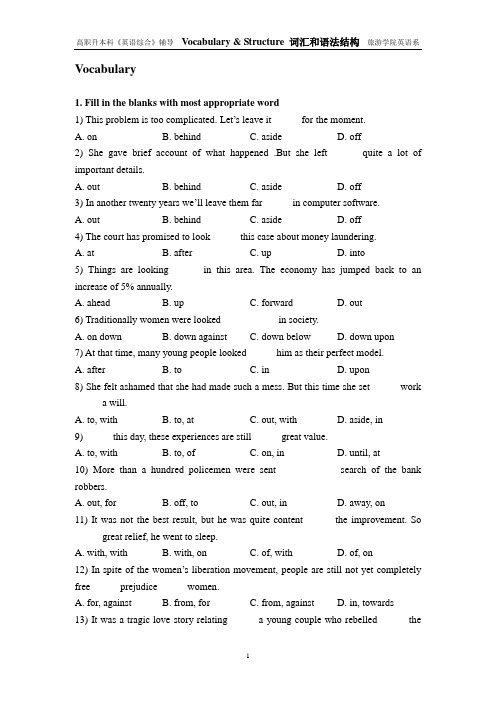
Vocabulary1. Fill in the blanks with most appropriate word1) This problem is too complicated. Let’s leave it _____ for the moment.A. onB. behindC. asideD. off2) She gave brief account of what happened .But she left _____ quite a lot of important details.A. outB. behindC. asideD. off3) In another twenty years we’ll leave them far _____ in computer software.A. outB. behindC. asideD. off4) The court has promised to look _____ this case about money laundering.A. atB. afterC. upD. into5) Things are looking _____ in this area. The economy has jumped back to an increase of 5% annually.A. aheadB. upC. forwardD. out6) Traditionally women were looked _____ _____ in society.A. on downB. down againstC. down belowD. down upon7) At that time, many young people looked _____ him as their perfect model.A. afterB. toC. inD. upon8) She felt ashamed that she had made such a mess. But this time she set _____ work _____ a will.A. to, withB. to, atC. out, withD. aside, in9) _____ this day, these experiences are still _____ great value.A. to, withB. to, ofC. on, inD. until, at10) More than a hundred policemen were sent _____ _____ search of the bank robbers.A. out, forB. off, toC. out, inD. away, on11) It was not the best result, but he was quite content _____ the improvement. So _____ great relief, he went to sleep.A. with, withB. with, onC. of, withD. of, on12) In spite of the women’s liberation movement, people are still not yet completely free _____ prejudice _____ women.A. for, againstB. from, forC. from, againstD. in, towards13) It was a tragic love story relating _____ a young couple who rebelled _____ thetraditional arranged marriage.A. with, toB. to, atC. with, againstD. to, against14) Modern educational theories require teachers to interact _____ students. They should model _____ their students of course. But they should also learn from the people they teach.A. with, forB. with, afterC. on, afterD. on, for15) It suddenly dawned _____ me that there was another thing that contributed _____ their economic success.A. to, toB. on, toC. on, forD. to, for16) Historians have reacted very warmly _____ psychologists’recent discoveries. They agree that these discoveries have helped us to look at human history _____ a new light.A. against, withB. against, inC. to, withD. to, in17) They are still dependent _____ imports for more than 90% of their oil needs. It is impossible for their country to be completely independent _____ other countries.A. on, fromB. on, onC. from, fromD. from, on18) Many people rebelled _____ their government’s war policy in Vietnam. It was equal _____ a civil war.A. to, toB. against, asC. at, toD. against, to2.Fill in the blanks with the appropriate word1)Has he gone _____ his mind? Why didn’t he go _____ the contract morecarefully before he signed it?A. out, overB. off, overC. out of, throughD. out of, over2) There’s something mysterious going _____ in our economy. People’s income keepsgoing _____. But the market is not responding.A. on, upB. on, downC. along, forwardD. along, up3) I don’t pretend to know very much about physics. So I won’t go _____ thescientific theory.A. intoB. toC. forD. in4) In a state of crisis, it is usually the weak that goes _____; it goes _____ nations aswell as individuals.A. down, forB. under, toC. out, forD. under, for5) After graduation he decided to go _____ but as time went _____, he began to find itboring. He couldn’t imagine himself spending all his life going ______ money.A. in for, on, afterB. into, on, afterC. in for, off, forD. after, along, at6) The color of your tie should go ____ your shirt. These two colors just don’t go _____.A. for, alongB. along, togetherC. with, longD. with, together7) The bomb went _____ in front of the embassy, killing one child and injuring a dozen others.A. upB. outC. ofD. off8) I don’t go _____ hard rock. It’s much too noisy _____ my taste.A. after, withB. for, forC. with, withD. with, for9) Can you help me ______ my paper? I don’t know how to go ______ it.A. with, aboutB. on, aboutC. for, withD. at, for10) We must see _____ it that we have enough money left to see us ______ the rest of the month.A. about, forB. to, forC. to, throughD. on, through11) Times have changed. But some people still cling ______ their old ideas. This is known _____ a cultural lag.A. to, asB. at, asC. to, forD. on, for12) It is really comic to see how some people try to show ______ their knowledge _____ speaking or writing in a way nobody can understand.A. up, byB. off, forC. off, byD. out, with13) I know why he gave me all the expensive gifts. He wanted me to hush it______.A. downB. upC. offD. away14) I sympathize _____ her. I know why she didn’t show ______ that day.A. for, upB. with, inC. to, offD. with, up15) We all have great sympathy______ the laid off workers. But it is not enough just to be sympathetic.A. for, toB. to, forC. with, toD. with, for3.Fill in the blanks with the appropriate propositions or adverbs.1)We haven’t got much time. Let’s get ______ ______ business.A. back onB. on forC. down toD. over with2) This thing is extremely boring. It’s getting _____ my nerves. Come on. Let’s get it ______ and done with.A. on, overB. to, overC. on, throughD. to, through3) The death of his wife was a big blow _____ him. He just couldn’t get _____ it.A. for, throughB. to, overC. at, awayD. to, beyond4) He was very easy to get _____with. And although he was poor, he managed to get _____because he was single and had very simple needs.A. along, byB. away, alongC. around, alongD. on, by5) The news of this killing in broad daylight got ______very quickly. But the murderer was not at all afraid. He thought that because he was the son of the police chief, he could get _____ with it.A. round, onB. about, wayC. round, awayD. back, on6) When you get ______ with this training course, you won’t have much difficulty getting _____ simple ideas in English.A. through, acrossB. over, throughC. on, acrossD. away, over7) Don’t take me _____a fool. I’m not so easily taken _____.A. for, inB. as, inC. as, intoD. for, into8) I pleaded _____ him to apologize to his boss and take _____ what he said. But he wouldn’t listen.A. to, backB. for, inC. with, backD. to, away9) Everybody says that he takes _____ his grandfather, _____ his big fleshy nose and fierce eyes.A. to, withB. after, forC. after, withD. from, like10) I have great confidence ______ these talented young people. They will be able to take ______ my job.A. for, overB. about, upC. in, overD. on, on11) I’m very grateful ______ him because he has promise to take this load ______ my shoulder.A. to, offB. for, downC. with, fromD. to, down12) ______ that time, the reform had begun to take effect, and the economy had begun to take ______.A. at, offB. by, offC. during, upD. by, up13) Children like to take things ______ because they are curious. Don’t scold them.A. offB. awayC. alongD. apart14) We will take _____ the expressway after 10 years of its operation according to the contract.A. overB. backC. awayD. up15) Let’s get a smaller table. This one takes _____ too much room.A. offB. awayC. offD. up16) I hear you subscribe _____ South China Weekend. Which section are you particularly fond _____?A. to, ofB. in, ofC. to, offD. from, at17) I can’t figure _____ why people attach so much important _____GDP.A. out, toB. in, ofC. to, offD. up, to18) Sooner or later we will have to come _____ grips_____our educational reform.A. in, withB. to, withC. for, onD. in, on19) When this landscaping plan is carried ______, our city will take _____ a new look.A. on, upB. out, upC. on, outD. out, on20) The prices of TV sets are about 20% ______. The manufacturers are almost selling their products ______ cost.A. off, atB. down, atC. less, forD. lower, on4.Fill in the blanks with the appropriate propositions or adverbs1)As soon as she got home, she set ___________ preparing dinner.A. toB. aboutC. forthD. out2)Many observers believe that a new economic recession has set __________ forthat country.A. outB. offC. downD. in3) The debate is still going on whether people should continue to be forbidden to set ______ fireworks in big cities during national holidays.A. offB. outC. upD. to4) If we all set ______ work, we can fulfill our plan ahead of schedule.A. toB. aboutC. onD. at5) A nuclear war will set _____ the economic development of both countries for many years.A. offB. downC. asideD. back6) Time is running ______. The international community must take immediate action.A. awayB. offC. alongD. out7) He was run ______ by a speeding car and died instantly.A. uponB. overC. downD. into8) This has never been tried before. So it’s natural that we’ll run ______ all kinds of difficulties.A. uponB. acrossC. intoD. over5. Fill in the blanks with the most appropriate word in the brackets.1) When he heard the news, he was infuriated _______.A. without wordsB. beyond wordsC. speechlessD. at a loss for words2) When she saw how frightened he was at his mistake, her anger began to ______.A. fade awayB. die awayC. fall downD. die down3) She ______ him to give her another chance.A. beggedB. insisted onC. demandedD. pleaded4) He was so angry that his whole body ______.A. trembledB. shiveredC. shudderedD. shook5) He was mortally wounded in the stomach. That night he died with a _____ look on his face.A. contentB. contentedC. satisfyingD. satisfactory6) ______ all our efforts, students are still not happy with the progress of our teaching reform.A. WithB. ForC. Instead ofD. In spite7) Can you break _______ this long sentence into simpler ones?A. offB. downC. upD. away8) I just need a good computer. _______ that I really don’t need anything.A. BesideB. On top ofC. In addition toD. Apart from6. Fill in the blanks with the appropriate word.1) Only _______ those conditions can we live _______ each other.A. under, in peace and harmony withB. by, in peace and harmony withC. with, under peace and harmony withD. under, in peace and harmony for2) _______ we seem to have conquered nature. But this is not true. Many scholars actually say that we should stop ______ nature before it is too late.A. On the surface, tempering toB. On the surface, tempering withC. On the appearance, tempering withD. In surface, interfering with3) What happened that day had a great ______ on people’s lives. Now they all knowthat no country can be completely _______ terrorist attack.A. effect, immune toB. impact, immune fromC. influence, free toD. result, free from4) We have already ______ the terms, but the contract will have to be ______ higher authorities for approval.A. settled on, subjected forB. agreed with, referred toC. agreed on, taken forD. settled on, subjected to5) One problem is the lack of strict inspection. People actually either know or ______ those who ______ garbage.A. know of, raise their pigs inB. know about, feed their pigs toC. know of, feed their pigs onD. know, raise their pigs with6) The other day I came ______ a book, which came ______ quite recently. It argues that education should not be too closely ______ market needs.A. across, up, geared toB. across, out, geared toC. up with, out, linked toD. into, out, connected with7) Where did you come _______ these oranges? They are not easy to come _____ at this time of the year.A. across, byB. by, acrossC. into, upD. upon, about8) We were ______ a great dilemma. But then Wei Ming came ______ a brilliant idea.A. facing to, upB. faced with, up withC. thrown into, acrossD. confronted with, to9) She is still single, waiting for the right man to come ______, I suppose. But it’s not easy because she considers herself a swan _______ ugly ducklings.A. along, in the midst ofB. up, in the middle ofC. across, among the midst ofD. to her, beyond the reach to10) _______ New York is a world in itself because many different races and ethnic groups _______ each other.A. In a certain extent, intermingle withB. To a certain degree, live withC. In a certain way, are mixed up withD. To a certain extent, intermingle with11) The reform and open policy has changed our life ______. And I believe more interesting changes are _______.A. in every way, on the wayB. for the way, along the wayC. on every way, under wayD. in many ways, in the way12) Don’t let us put it _______ until tomorrow. Let’s get it _______ the way.A. aside, out ofB. off, out ofC. away, offD. off, outside13) It’s sickening to see him go ______ his way to please his boss. Somebody ought to tell him that nobody can ______ other people’s favors alone.A. out of, live onB. beyond, rely onC. on, live byD. out of, live off14) The construction of the dam is already ______. But its completion is still a long way ______.A. under its way, offB. in progress, awayC. under progress, to goD. under way, off15) I planned to fly to New York ______ Tokyo, but in Tokyo I was delayed for ten hours, and JAL gave me 10,000 yen ______ an apology.A. by the way of, to showB. via, for the sake ofC. by way of, by way ofD. via, for7. Fill in the blanks with the appropriate word1) To pass a law is ______. The most difficult thing is how to break ______ the resistance of those local officials who have benefited greatly ______ the old practices.A. relatively easier, down, fromB. comparatively easier, up, fromC. relatively easy, down, fromD. reasonably easy, through, in2) The final negotiations broke ______, the representatives were all called ______ by their governments, and soon war broke ______ between them.A. down, back, outB. up, away, outC. down, home, upD. up, back, up3) A friend of mine told me that his apartment had been broken ______ twice within two months. So he had decided to move _______ safety.A. down, for the sake ofB. through, for the purpose ofC. into, for the sake ofD. in, for the benefit4) We have covered all the issues ______ one. I suggest we break ______ for lunch and continue this afternoon.A. except, upB. except for, upC. instead of, offD. except, off5) The police were called ______ to break _______ the demonstration. But the police stood ______ the demonstrators.A. on, up, on the side ofB. out, up, on the side ofC. up, down, byD. out, up, behind6) The new situation ______ important changes ______ of our life.A. calls for, in every aspectB. requires, on every aspectC. demands for, from every aspectD. acquires, with every aspect7) He worked for three days and nights and finally broke ______. When his daughter saw his ashen face, she broke ______ a cold sweat.A. down, upB. up, inC. down, into D up, into8) We were originally ordered to ______ the enemy lines before sundown. But the plan was suddenly ______.A. break through, called offB. get through, cancelled offC. get across, dropped downD. slip through, called of9) Young couples should think twice before they ______. Divorce is very often not a very good idea ______ their differences.A. break, in spite ofB. break up, regardless ofC. break off, instead ofD. break away, for10) If you ______, you see a lot of people from the countryside going from city to city, ______ that they might find a job.A. look around, hopedB. see round, in the attemptC. look round, in the sakeD. look round, in the hope11) People will always compete ______ opportunities and ______ success. It is almost _____ their genes.A. for, strive towards, build intoB. for, strive for, written onC. on, struggle for, rooted inD. for, strive for, built into12) The profits will be ______ our partners ______ their contributions ______ the total investment.A. shared with, in proportion to, toB. shared among, in proportion of, toC. divided among, according to, onD. shared with, on the basis of, to13) Young people’s plans are often ______ those of their parents. They are not satisfied ______ the life arranged for them. They want to _____ out _____ their own.A. different from, of, strike, onB. in conflict with, with, branch, onC. contradictory to, with, strike, forD. opposed to, to, strike, in14), Money is often ______ the idea of happiness. But it is wrong. In a civilized society, people wouldn’t attach too much importance ______ material things.A. associated with, toB. associated with, onC. related with, toD. related to, at8. Fill in the blanks with the appropriate word1) She was seriously _____ in the railway accident and remained _____ for weeks. Everybody had given _____ on her. Nobody had expected her to be able to pull _____.A. injured, in a coma, up, throughB. wounded, unconscious, in, toC. wounded, unconscious, away, outD. injured, in a coma, up, through2) Tell them that if they do not accept our _____ this time, the deal is ______ .We will pull _____.A. terms, off, outB. conditions, over, awayC. terms, gone, backD. conditions, out, off3) The lawyer _____ to prepare his will ran ______ what the man had scribbled on the paper. He smiled because it only ______ three short sentences: I owe a lot. I own nothing. The rest I leave to all my children.A. called on, across, made ofB. called on, through, consisted ofC. was called on, over, containedD. who came, through, was consisted of4) At first many people thought that this great disaster would inflict a terrible damage ______ the economy. But for some strange reason it touched ______ a great shopping spree.A. to, ofB. on, uponC. on, offD. for, downStructure1. Complete each of the following sentences with the most likely answer1) The Foreign Minister, with his assistants and secretaries,_______ left for Paris for an international conference.A. areB. isC. haveD. has2) You’d rather not go to the picnic, _______ you?A. shouldB. hadC. mustD. would3) It was impolite of you to leave without saying goodbye; you really _______ have done so.A. shouldn’tB. wouldn’tC. couldn’tD. mustn’t4) Efforts were made ______ that everything would be ready before the guests arrived.A. to ensureB. ensuringC. to have ensuredD. being ensured5) The freezing point is the temperature ______ water turns into ice.A. from whichB. from thatC. at whichD. at that6) ______ I had the money, I wouldn’t buy such an expensive thing.A. UnlessB. If onlyC. WhenD. Even if7) Not only ______the film, but he met and talked with the director as well.A. he did seeB. did he seeC. had he seenD. he saw9) The two sisters always have a lot to tell each other, either over the phone or ______ person.A. inB. withC. underD. of10) ______up with the world’s best automobile manufactures, you’ve got tomodernize management, not only equipment.A. CatchingB. To catchC. Having caughtD. To be caught11) There is no denying the fact ______quite a number of insects, birds and animals are dying out.A. thatB. whyC. howD. which12) The most important part of a computer is the computer brain ______ CPU.A. knownB. known asC. to be knownD. to be know as13) The first thing you should have learned at college is to work on your own. It’stime you ______ able to manage your time.A. could beB. should beC. wereD. are14) I’ve got a piece of paper stuck in the printer. Could you tell me ______?A. to get out itB. how to get it outC. to get it outD. how to get out of it15) Much of the boy’s free time ______ the Internet.A. spends surfingB. is spent surfingC. spent surfingD. is spent to surf2. Complete each of the flowing sentences with the most likely answer1) They had to leave quietly______ be seen by the plainclothes men.A. as so not toB. so as not toC. not so as toD. so not as to2) –Where is your brother?--He ______to the library.A. had goneB. had beenC. must have beenD. must have gone3) A new all-purpose building ______ in the mountain village for shopping, business and indoor sports.A. is now constructingB. is now being constructedC. has now constructedD. has been now constructed4) If you had done as I told you to do, this ______A. should have not happenB. did not happenC. would not have happenedD. had not happened5) ______ a bus stop near the museum is a disadvantage to tourists.A. there not beingB. there being notC. there not havingD. there having not6) I quit understand ______ to discus the matter under the circumstances.A. you not wantB. you to not wantC. not your wantingD. your not wanting7) Do you feel like ______ to a firm or would you rather ______ at home.A. to go, to stayB. going, stayC. to go, stayingD. going, to stay8) That’s one of those questions that really ______.A. needn’t to be answeredB. needn’t to answerC. don’t need answeringD. don’t need to answer9) You’d rather I don’t tell her about it, ______?A. wouldn’t youB. didn’t youC. should you.D. had you10) ______ the road and you will come to the post office.A. if you were to turn offB. turn offC. turning offD. having turned off11) The reason ______ I don’t go to the party was ______ I got a bad cold that evening.A. because, thatB. because, becauseC. why, thatD. why, because12) Since we didn’t have time to spare, we couldn’t visit all the places ______.A. where I should like to visitB. which I would like to visit themC. where I would have like toD. which I should have like to13) ______ your own private feelings may be, it’s best to take his advice.A. whateverB. whatC. howeverD. how14) I haven’t yet considered the question ______ in your last letter.A. to be raisedB. having been raisedC. being raisedD. raised15) Only then did he ______ the situation he and his fellow soldiers were in.A. aware ofB. awareC. become aware ofD. become aware3. Complete each of the following sentences with the most likely answer.1) According to the medical report, ______ 75 percent of the current violent crime is drug-related.A. so many asB. as many asC. so much asD. as much as2) I don’t regret ______ her what I thought of her husband, even though it might have upset her.A. tellingB. to tellC. that I will tellD. to have to tell3) The more time you waste, the easier it is go on ______ time.A. wasteB. to wasteC. wastingD. wasted4) ______ two hours daily made considerable difference to my physical condition.A. walkingB. to walkC. I walkedD. having walked5) ______ could take notes as fast as the professor talked. I usually missed more than half of ______ lecture.A. every one, eachB. no one, eachC. anyone, everyD. someone, every6) On TV every taxi driver looks as if he had nothing ______ to drive 90 miles an hour, trying to keep up with another car, often in pouring rain.A. more to do butB. better to do thanC. else to do exceptD. interesting to do besides7) It won’t be long ______ China launches her space shuttle with men in it.A. whenB. untilC. beforeD. after8) ______ dark clouds gathering, he decided to stay at home.A. having to seeB. to seeC. having been seeingD. seeing9) The American expression “burning your bridges” means acting in ______ way that you destroy any chance to turn back or change your action.A. theB. aC. such theD. such a11) The plant community ______ in a certain area becomes a food source for a community of animals ______ to that area.A. grown, attractingB. growing, attractedC. growing, attractingD. grown, attracted12) I was one of those people who went to ______ college knowing exactly what I want to do with ______ life.A. /, myB. a, theC. /, theD. my, my13) ______ grading the computer-based tests and providing technical support, I noticed flaws in the design of the software itself.A. byB. forC. whileD. as14) By the time this article goes to press, I ______ my master’s degree in hand.A. would haveB. would have hadC. will haveD. should have15) After ______ thought, I decided to accept an offer from ______ Fortune 500company that produces computer software and hardware.A. many, aB. much, aC. many, oneD. much, one4. Complete each of the following sentences with the most likely answer.1) I think Mrs. Allen ______ be happier if she had a job outside the home.A. wouldB. willC. canD. should3) ______ sufficient time, they would surely have done better.A. being givenB. to giveC. givenD. giving4) ______ the environment requires planning and the cooperation of all countries on earth.A. to be improvingB. improvingC. having improvedD. improvement5) There are many words in English which may be spelled, with equal correctness, in ______ of two ways.A. bothB. neitherC. eitherD. none6) The young pilot had completed a cross-country flight ______ he almost collided into another aircraft.A. of which timeB. during that timeC. at whichD. during which7) ______ to the funeral of a big shot in show business, the couple tried to get a chance to be seen there.A. invited notB. not having invitedC. weren’t invitedD. not having been invited8) Don’t be so disheartened; it’s only a matter of time ______ your talent is recognized.A. afterB. whenC. beforeD. since9) She woke up to find the letter still lying on the bedside table. She ______ put it into the mailbox to catch the 5 pm collection yesterday.A. must haveB. should haveC. have had toD. would have10) I don’t think a man of your grandfather’s age ______ moved this heavy desk out of the room all by himself.A. could haveB. must haveC. should haveD. ought to have11) ______ as the young couple needed money to make the down payment for the apartment, they wouldn’t ask their parents for help.A. evenB. thoughC. muchD. hurriedly12) Pointing to a very decent sofa and a few easy chairs, he said, “The furniture in this room ______ mostly obtained form yard sales.”A. wereB. areC. had beenD. was13) He came to the conclusion at the end of this report ______ developed countries should reduce the debts of the least developed countries.A. on whichB. in whichC. thatD. which14) ______ on-going division between English-speaking Canadians and。

高中英语语法整理总结归纳高中英语语法归纳总结介词I. 要点1、介词和种类(1) 简单介词,常用的有at, in, on, about, across, before, beside, for , to, without等。
(2) 复合介词,如by means of, along with, because of, in front of, instead of等。
2、介词和其他词类的习惯搭配关系(1) 和动词的搭配,如agree with, ask for, belong to, break away from, care about等。
(2) 和形容词的搭配,如afraid of, angry with, different from, good at(3) 和名词的搭配,如answer to , key to, reason for, cause of, visit to等.3、介词短语可以有自己的修饰语,这种修饰语通常有right, just, badly, all, well, directly, completely等少数几个副词。
如:He came right after dinner.He lives directly opposite the school.4、某些介词的意义与用法举例(1) at, on, in(表时间)表示时间点用at,如at four oclock, at midnight等;表示不确定的时间或短期假日也用at,如at that time, at Christmas等。
指某天用on, 如on Monday, on the end of November, 指某天的朝夕用on,如on Friday morning, on the afternoon of September 1st 等。
指长于或短于一天的时段用in,如in the afternoon, in February, in Summer, in 1999等。

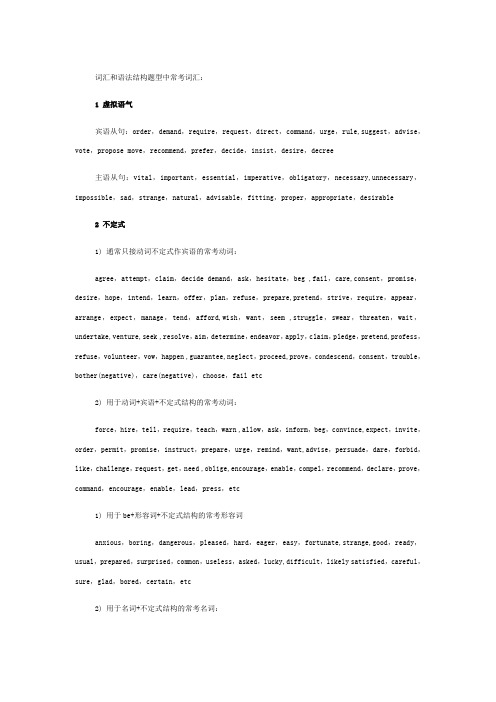
词汇和语法结构题型中常考词汇:1 虚拟语气宾语从句:order,demand,require,request,direct,command,urge,rule,suggest,advise,vote,propose move,recommend,prefer,decide,insist,desire,decree主语从句:vital,important,essential,imperative,obligatory,necessary,unnecessary,impossible,sad,strange,natural,advisable,fitting,proper,appropriate,desirable2 不定式1) 通常只接动词不定式作宾语的常考动词:agree,attempt,claim,decide demand,ask,hesitate,beg ,fail,care,consent,promise,desire,hope,intend,learn,offer,plan,refuse,prepare,pretend,strive,require,appear,arrange,expect,manage,tend,afford,wish,want,seem ,struggle,swear,threaten,wait,undertake,venture,seek ,resolve,aim,determine,endeavor,apply,claim,pledge,pretend,profess,refuse,volunteer,vow,happen ,guarantee,neglect,proceed,prove,condescend,consent,trouble,bother(negative),care(negative),choose,fail etc2) 用于动词+宾语+不定式结构的常考动词:force,hire,tell,require,teach,warn ,allow,ask,inform,beg,convince,expect,invite,order,permit,promise,instruct,prepare,urge,remind,want,advise,persuade,dare,forbid,like,challenge,request,get,need ,oblige,encourage,enable,compel,recommend,declare,prove,command,encourage,enable,lead,press,etc1) 用于be+形容词+不定式结构的常考形容词anxious,boring,dangerous,pleased,hard,eager,easy,fortunate,strange,good,ready,usual,prepared,surprised,common,useless,asked,lucky,difficult,likely satisfied,careful,sure,glad,bored,certain,etc2) 用于名词+不定式结构的常考名词:failure,offer,plan,ability,decision,desire,chance,permission,occasion,fun,honor,capacity,wish,pleasure,opportunity,demand,way ,refusal,responsibility,freedom,promise,etc.3) 后面跟省去“to”的不定式作宾补的常考动词:see watch,notice,observe,hear,listen to,feel ,get,make,have,let ,help,bid,know,look at ,smell,etc1、叙述文叙述文一般以讲述个人生活经历为主,对于经历的陈述通常由一定的时间概念贯穿其中,或顺序或倒序。
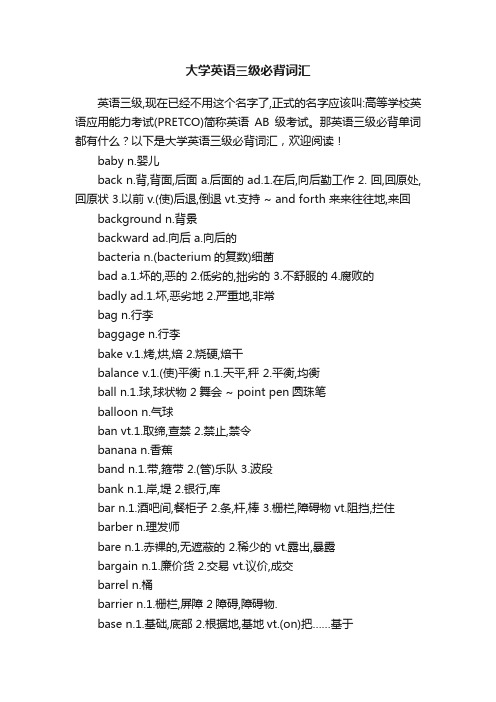
大学英语三级必背词汇英语三级,现在已经不用这个名字了,正式的名字应该叫:高等学校英语应用能力考试(PRETCO)简称英语AB级考试。
那英语三级必背单词都有什么?以下是大学英语三级必背词汇,欢迎阅读!baby n.婴儿back n.背,背面,后面 a.后面的 ad.1.在后,向后勤工作 2. 回,回原处,回原状 3.以前 v.(使)后退,倒退 vt.支持 ~ and forth 来来往往地,来回background n.背景backward ad.向后 a.向后的bacteria n.(bacterium的复数)细菌bad a.1.坏的,恶的 2.低劣的,拙劣的 3.不舒服的 4.腐败的badly ad.1.坏,恶劣地 2.严重地,非常bag n.行李baggage n.行李bake v.1.烤,烘,焙 2.烧硬,焙干balance v.1.(使)平衡 n.1.天平,秤 2.平衡,均衡ball n.1.球,球状物 2舞会 ~ point pen圆珠笔balloon n.气球ban vt.1.取缔,查禁 2.禁止,禁令banana n.香蕉band n.1.带,箍带 2.(管)乐队 3.波段bank n.1.岸,堤 2.银行,库bar n.1.酒吧间,餐柜子 2.条,杆,棒 3.栅栏,障碍物 vt.阻挡,拦住barber n.理发师bare n.1.赤裸的,无遮蔽的 2.稀少的 vt.露出,暴露bargain n.1.廉价货 2.交易 vt.议价,成交barrel n.桶barrier n.1.栅栏,屏障 2障碍,障碍物.base n.1.基础,底部 2.根据地,基地vt.(on)把……基于basic a.1.基本的,基础的basin n.1.盆,脸盆 2.盆地basis n.基础,根据 on the ~ of根据,在……的基础上basket n.篮,篓bat n.篮球bath n.1.浴,洗澡 2.浴缸 v.[英](给洗澡bathe vt.[美] (给)……洗澡 vi.(在河,海里)游泳,洗澡bathroom n.1.浴室 2.盥洗室battery n.电池(组)battle n.战役,战斗,斗争 v.斗争,搏斗bay n.海湾,湾be vi.1.是 2.在,存在 3到达,来到 4.发生 aux.v.1.[与动词的现在分词连用,构成各种进行时态2.[与及物动词的过去分词连用,构成被动语态beach n.海滩,湖滩,河滩beam n.1.梁,桁条 2.(光线的)束,柱bean n.豆,蚕豆bear 负担,负荷,承担 2.忍受,容忍 3.结(果实),生(孩子)beard n.胡须beast n.1.兽,家畜 2.凶残的人,举止粗鲁的人beat v.打,敲 vt.打败,战胜 vi.(心脏等)跳动 n.1.敲打,敲击声 2.(心脏等)跳动beautiful a.1.美的,美好的beauty n.1.美,美丽 2.美人,美的东西because conj.因为 ~ of由于become vi.1.成为,变得bed n.1.床 2.苗床,花圃,河床,矿床架fall in with符合,与一致;碰见be absorbed in 专心于carry on 继续下去far from远非;远离be attached to 附属于,隶属于carry out贯彻,执行,实现feel like 欲,想要be concerned with 有关,从事于cast light on 阐明,使明figure out计算出,理解,明白be known as 被认为,被称为catch up with赶上fill in填充,填写be made up of 由构成check in在(旅馆、机场等)登记,报到bear in mind 记住check out 结账离去,办妥手续离去find out查明,弄清because of由于clear away扫除,收拾first of all首先,第一before long 不久以后clear up整理,收拾;消除,解除for a moment片刻,一会儿both…and 既又,两个都come into effect生效,实施for a while暂时,一时break down 损坏come into force 生效,实施for ever永远break off 断绝,结束come into operation开始,运转,开工for example 例如break out逃出词汇记忆技巧口诀记忆词汇法小时候,咱们为了记忆词汇方便,经常喜欢将地理的名词编成小的顺口溜如四大著名石窟,咱们为了方便记忆词汇,记成一个叫云龙的人卖(麦)馍(莫)即云龙卖馍---云指云岗石窟,龙指龙门石窟,麦指麦积山石窟,莫指莫高窟。
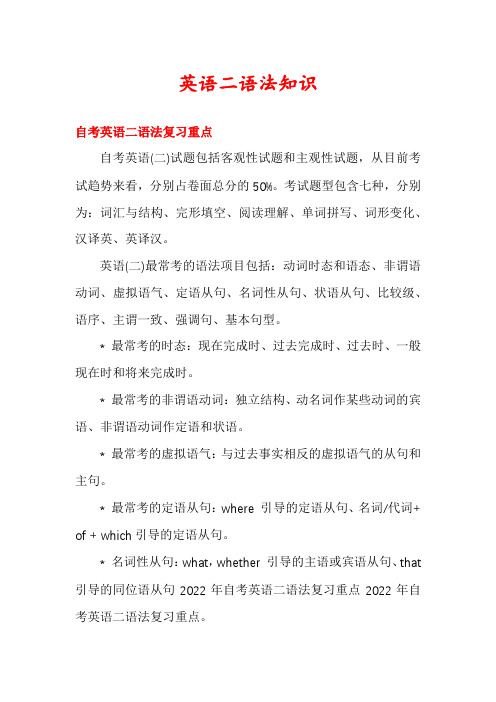
英语二语法知识自考英语二语法复习重点自考英语(二)试题包括客观性试题和主观性试题,从目前考试趋势来看,分别占卷面总分的50%。
考试题型包含七种,分别为:词汇与结构、完形填空、阅读理解、单词拼写、词形变化、汉译英、英译汉。
英语(二)最常考的语法项目包括:动词时态和语态、非谓语动词、虚拟语气、定语从句、名词性从句、状语从句、比较级、语序、主谓一致、强调句、基本句型。
* 最常考的时态:现在完成时、过去完成时、过去时、一般现在时和将来完成时。
* 最常考的非谓语动词:独立结构、动名词作某些动词的宾语、非谓语动词作定语和状语。
* 最常考的虚拟语气:与过去事实相反的虚拟语气的从句和主句。
* 最常考的定语从句:where 引导的定语从句、名词/代词+ of + which引导的定语从句。
* 名词性从句:what,whether 引导的主语或宾语从句、that 引导的同位语从句2022年自考英语二语法复习重点2022年自考英语二语法复习重点。
* 状语从句:now that,in that,in case,as,while 引导的状语从句。
自考英语(二)科目往年高分复习技巧归纳,具体详情如下:1、教材的主要内容大学英语(二)课程根据全国高等教育自学考试指导委员会要求,使用全国统一教材,大学英语自学教程(上下册),上册25单元,下册15单元。
每单元两篇课文,A篇课文要求精读后主动掌握,B篇课文则只要求理解。
2、出题类型和规律本课程自学考试命题的广度和难度根据本考试大纲规定的知识范围和能力要求确定。
试题包括客观性试题和主观性试题,从目前考试趋势来看,分别占卷面总分的50%2022年自考英语二语法复习重点文章2022年自考英语二语法复习重点出自/article/wk-__-__.html,转载请保留此链接!。
考试题型包含七种,分别为:词汇与结构、完形填空、阅读理解、单词拼写、词形变化、汉译英、英译汉。
3、复习重点本课程的重点是英语的基本词汇和语法,课程的主要目的是培养阅读能力。
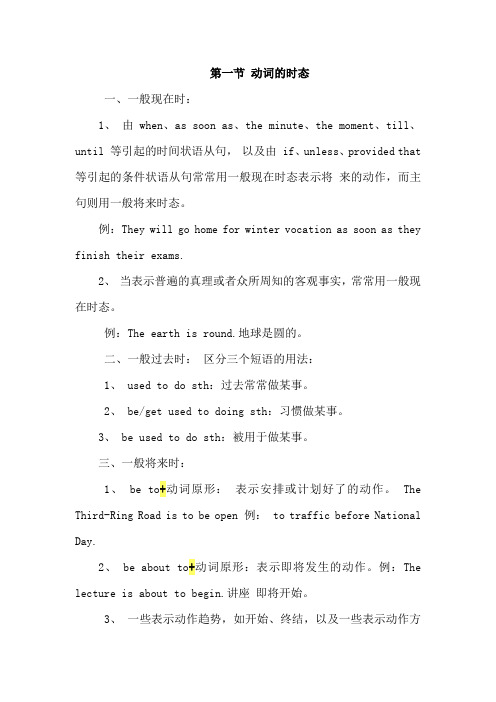
第一节动词的时态一、一般现在时:1、由 when、as soon as、the minute、the moment、till、until 等引起的时间状语从句,以及由 if、unless、provided that 等引起的条件状语从句常常用一般现在时态表示将来的动作,而主句则用一般将来时态。
例:They will go home for winter vocation as soon as they finish their exams.2、当表示普遍的真理或者众所周知的客观事实,常常用一般现在时态。
例:The earth is round.地球是圆的。
二、一般过去时:区分三个短语的用法:1、 used to do sth:过去常常做某事。
2、 be/get used to doing sth:习惯做某事。
3、 be used to do sth:被用于做某事。
三、一般将来时:1、 be to+动词原形:表示安排或计划好了的动作。
The Third-Ring Road is to be open 例: to traffic before National Day.2、 be about to+动词原形:表示即将发生的动作。
例:The lecture is about to begin.讲座即将开始。
3、一些表示动作趋势,如开始、终结,以及一些表示动作方向,如往来的动词,常常用现在进行时态表示按照安排将于将来发生的事情,这类动词常见的有如: start, go, leave, come, arrive 等。
例:We are leaving for Beijing tomorrow.我们明天动身去北京。
四、进行时态:重点区分 when 和 while 引起的时间状语的用法。
When 表示时间上的点,在考试中其引导的时间状语从句多翻译为“这时…” ,主句多用进行时态;while 引导的时间状语从句多翻译为“正当…时” ,该从句用进行时态。
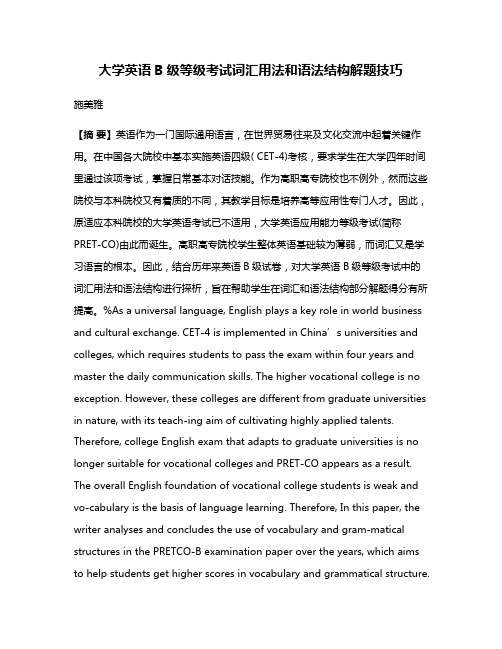
大学英语B级等级考试词汇用法和语法结构解题技巧施美雅【摘要】英语作为一门国际通用语言,在世界贸易往来及文化交流中起着关键作用。
在中国各大院校中基本实施英语四级( CET-4)考核,要求学生在大学四年时间里通过该项考试,掌握日常基本对话技能。
作为高职高专院校也不例外,然而这些院校与本科院校又有着质的不同,其教学目标是培养高等应用性专门人才。
因此,原适应本科院校的大学英语考试已不适用,大学英语应用能力等级考试(简称PRET-CO)由此而诞生。
高职高专院校学生整体英语基础较为薄弱,而词汇又是学习语言的根本。
因此,结合历年来英语B级试卷,对大学英语B级等级考试中的词汇用法和语法结构进行探析,旨在帮助学生在词汇和语法结构部分解题得分有所提高。
%As a universal language, English plays a key role in world business and cultural exchange. CET-4 is implemented in China’s universities and colleges, which requires students to pass the exam within four years and master the daily communication skills. The higher vocational college is no exception. However, these colleges are different from graduate universities in nature, with its teach-ing aim of cultivating highly applied talents. Therefore, college English exam that adapts to graduate universities is no longer suitable for vocational colleges and PRET-CO appears as a result. The overall English foundation of vocational college students is weak and vo-cabulary is the basis of language learning. Therefore, In this paper, the writer analyses and concludes the use of vocabulary and gram-matical structures in the PRETCO-B examination paper over the years, which aims to help students get higher scores in vocabulary and grammatical structure.【期刊名称】《黑龙江教育学院学报》【年(卷),期】2015(000)003【总页数】3页(P157-159)【关键词】词汇用法;语法结构;高职高专院校【作者】施美雅【作者单位】泉州华光职业学院,福建泉州362000【正文语种】中文【中图分类】H310.4根据高等学校英语应用能力B级考试大纲,词汇用法和语法结构为英语B级考试的第二部分,考试时间15分钟,题型为Section A的选择题和Section B的填空题。
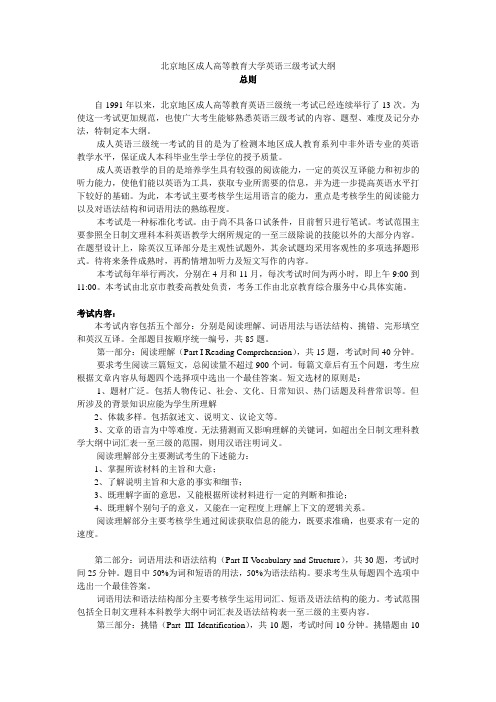
北京地区成人高等教育大学英语三级考试大纲总则自1991年以来,北京地区成人高等教育英语三级统一考试已经连续举行了13次。
为使这一考试更加规范,也使广大考生能够熟悉英语三级考试的内容、题型、难度及记分办法,特制定本大纲。
成人英语三级统一考试的目的是为了检测本地区成人教育系列中非外语专业的英语教学水平,保证成人本科毕业生学士学位的授予质量。
成人英语教学的目的是培养学生具有较强的阅读能力,一定的英汉互译能力和初步的听力能力,使他们能以英语为工具,获取专业所需要的信息,并为进一步提高英语水平打下较好的基础。
为此,本考试主要考核学生运用语言的能力,重点是考核学生的阅读能力以及对语法结构和词语用法的熟练程度。
本考试是一种标准化考试。
由于尚不具备口试条件,目前暂只进行笔试。
考试范围主要参照全日制文理科本科英语教学大纲所规定的一至三级除说的技能以外的大部分内容。
在题型设计上,除英汉互译部分是主观性试题外,其余试题均采用客观性的多项选择题形式。
待将来条件成熟时,再酌情增加听力及短文写作的内容。
本考试每年举行两次,分别在4月和11月,每次考试时间为两小时,即上午9:00到11:00。
本考试由北京市教委高教处负责,考务工作由北京教育综合服务中心具体实施。
考试内容:本考试内容包括五个部分:分别是阅读理解、词语用法与语法结构、挑错、完形填空和英汉互译。
全部题目按顺序统一编号,共85题。
第一部分:阅读理解(Part I Reading Comprehension),共15题,考试时间40分钟。
要求考生阅读三篇短文,总阅读量不超过900个词。
每篇文章后有五个问题,考生应根据文章内容从每题四个选择项中选出一个最佳答案。
短文选材的原则是:1、题材广泛。
包括人物传记、社会、文化、日常知识、热门话题及科普常识等。
但所涉及的背景知识应能为学生所理解2、体裁多样。
包括叙述文、说明文、议论文等。
3、文章的语言为中等难度。
无法猜测而又影响理解的关键词,如超出全日制文理科教学大纲中词汇表一至三级的范围,则用汉语注明词义。
词汇和语法结构题型中常考词汇:
1 虚拟语气
宾语从句:order,demand,require,request,direct,command,urge,rule,suggest,advise,vote,propose move,recommend,prefer,decide,insist,desire,decree
主语从句:vital,important,essential,imperative,obligatory,
necessary,unnecessary,impossible,sad,strange,natural,advisable,fitting,proper,appropriate,desirable
2 不定式
1) 通常只接动词不定式作宾语的常考动词:
agree,attempt,claim,decide demand,ask,hesitate,beg ,fail,care,consent,promise,desire,hope,intend,learn,offer,plan,refuse,prepare,pretend,strive,require,appear,arrange,expect,manage,tend,afford,wish,want,seem ,struggle,swear,threaten,wait,undertake,venture,seek ,resolve,aim,determine,endeavor,apply,claim,pledge,pretend,profess,refuse,volunteer,vow,
happen ,guarantee,neglect,proceed,prove,condescend,consent,trouble,
bother(negative),care(negative),choose,fail etc
2) 用于动词+宾语+不定式结构的常考动词:
force,hire,tell,require,teach,warn ,allow,ask,inform,beg,convince,expect,invite,order,permit,promise,instruct,prepare,urge,remind,want,advise,persuade,dare,forbid,like,challenge,request,get,need ,oblige,encourage,enable,compel,recommend,declare,prove,command,encourage,enable,lead,press,etc
1) 用于be+形容词+不定式结构的常考形容词
anxious,boring,dangerous,pleased,hard,eager,easy,fortunate,strange,good,ready,usual,prepared,surprised,common,useless,asked,lucky,difficult,likely satisfied,careful,sure,glad,bored,certain,etc转自环球网校
2) 用于名词+不定式结构的常考名词:
failure,offer,plan,ability,decision,desire,chance,permission,occasion,fun,honor,capacity,wish,pleasure,opportunity,demand,way ,refusal,responsibility,freedom,promise,etc.
3) 后面跟省去“to”的不定式作宾补的常考动词:
see watch,notice,observe,hear,listen to,feel ,get,make,have,let ,help,bid,know,look at ,smell,etc。